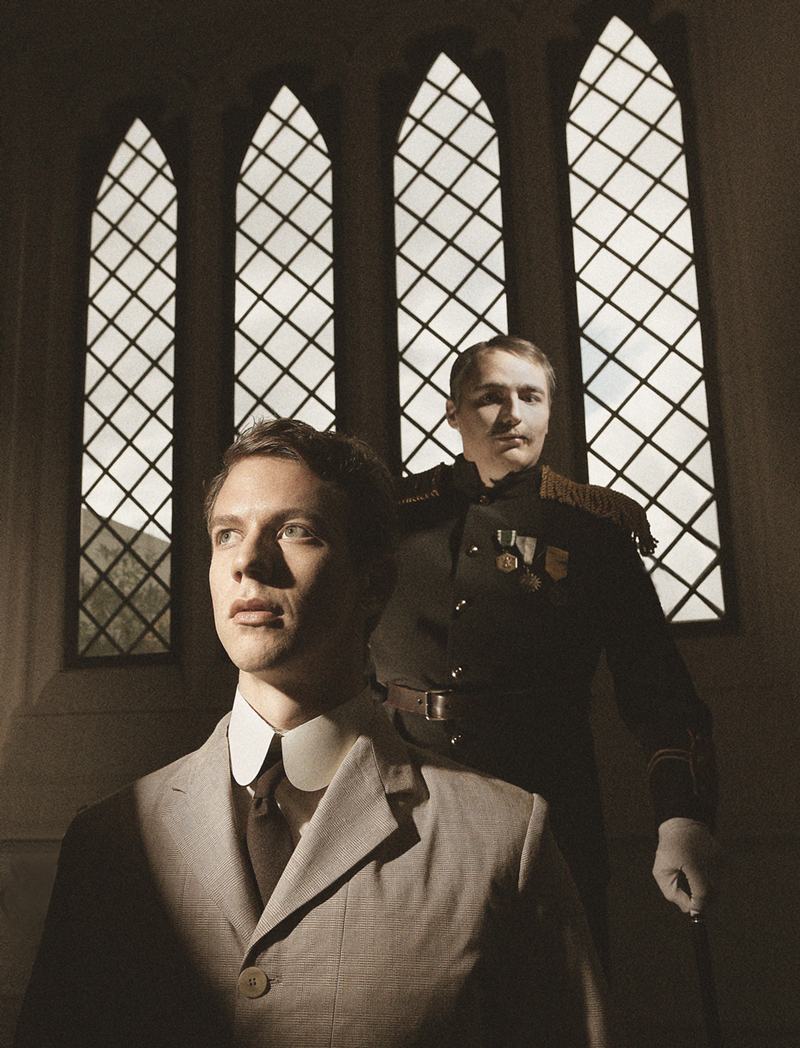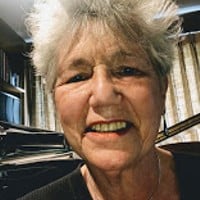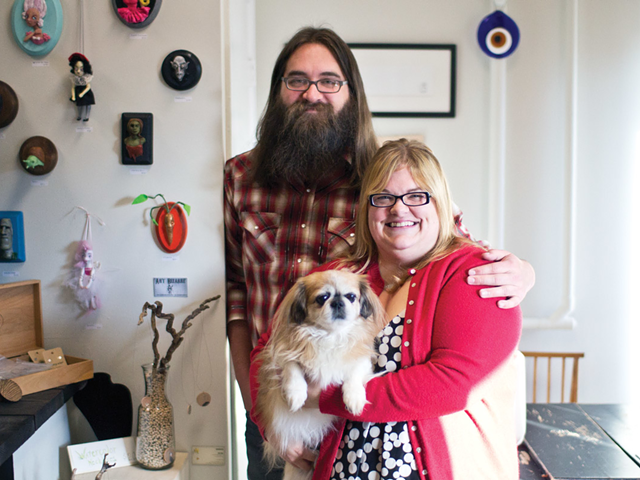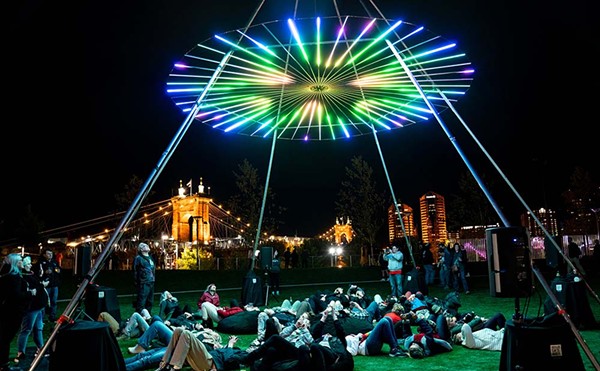T
he personal is definitely political in two operas onstage this month. The University of Cincinnati’s College-Conservatory of Music (CCM) performs Benjamin Britten’s Owen Wingrave, in which a young man chooses pacifism over a military career. The following week, the Cincinnati Opera and CCM collaborative effort Opera Fusion: New Works offers a workshop performance of Fellow Travelers, based on the novel about a gay love affair during the McCarthy era.
Performances of Owen Wingrave at CCM coincide with Britten’s 100th birthday on Nov. 22, and are sponsored by a grant from the Britten-Pears Foundation. Based on a short story by Henry James, Owen is the last member of a staunchly proud military family, which is outraged by his decision to buck tradition.
Britten himself was a lifelong pacifist and the Vietnam War was at its height when the BBC commissioned him to write this opera for television. Britten was appalled by the war but Ken Shaw, director of CCM’s production, says that Britten’s response was “an artistic expression, not anti-war propaganda.”
“Owen is like all of Britten’s lead characters,” Shaw says. “He’s dealing with ideas that stand apart from established norms. He rejects a military career and his family can’t deal with that.”
Although the Henry James work appears in a collection of ghost stories, Shaw is focusing on the realities. “There’s a history of abuse that no one acknowledges and that history destroys Owen,” he says.
Shaw admits that the characters of the Wingraves and Owen’s fiancée Kate can easily be portrayed as caricatures, but he points out that they’re no different from other dysfunctional families.
“We all know families who come from a point of view, driven by what they fear the most,” Shaw says. “Instead of being open and honest, which is what Owen tries to fight for, the family shuts down about this incident that happened generations ago. They’re not bad people but they’ve developed behaviors that are horrific.”
Shaw points out that Owen’s tutor in the opera, Coyle, is the only one capable of dealing with the depth of Owen’s pacifist convictions. Like Britten’s best operas, ambiguity abounds and Owen remains an outsider.
Shaw heads CCM’s undergraduate opera program and has staged several productions, but switching from staging an opera originally performed on television to on stage has special challenges that Shaw and his student designers are solving by using the set as a character that sets the mood. “We’re doing a lot with light and suggestions of scenery,” he says. “Our student designers are incredible. We do this kind of transition all the time here.”
And Shaw calls Britten’s score “utterly crisp.”
“There’s almost no exposition,” he says. “It’s a complete distilling of his genius. We go from ethereal moments to the most dramatic Britten I’ve ever heard. The score can change on a dime and every moment, he tells part of the story.”
The opera ends quietly, almost in a whisper.
“The theme is so vital and so relevant,” Robin Guarino, head of CCM’s opera department, says. “I think Britten was captivated by the gothic form in the James story that hints at what’s below the surface of culture and family.”
“My favorite line is, ‘Peace is not silent; it is the voice of love,’ ” Shaw says. “I simply think Owen’s fighting to be a loving person. We honor that message by being clear and simple. Britten wanted to define peace for himself.”
Another opera about ideology and love is Fellow Travelers.
During the McCarthy era, being anything but a straight anti-Communist meant the end of a career, if not life itself. The anti-gay “lavender scare” in the State Department was as virulent as the Red Scare promulgated by McCarthy and his henchmen. Fellow Travelers (based on the 2007 novel by Thomas Mallon) probes an overlooked part of that dark period. It’s the latest project for Opera Fusion: New Works, sponsored by the Andrew W. Mellon Foundation, which offers composers or composer/librettist teams the opportunity to workshop an opera during a 10-day residency culminating in a performance.
Librettist Greg Pierce knows Thomas Mallon and read the novel before he was approached to do an operatic adaptation. A self-described opera buff, he was eager to write his first libretto and daunted by the challenges.
“Mallon writes with such extraordinary detail and we still had to pare things down,” he says. “And because this is opera, we had to consider what translates operatically, so some great material was cut. There’s definitely a tragic element in Travelers and a romantic, passionate love story. Although that’s our focus, we wanted to pay tribute to those people who were punished for being who they were.”
In the story, Hawkins Fuller, a closeted State Department official on the rise, meets Tim Laughlin, a devoted Catholic and anti-Communist eager to join the purges. The aptly named Hawk gets Tim a job with a senator in league with McCarthy, and Tim quickly falls in love with the older, seductive Hawk. Both men are caught up in the maelstrom of paranoia and its devastating impact on gays and lesbians.
“The world of closeted gay men is full of intrigue and subtext, and opera is all about subtext,” composer Gregory Spears says. “This is a love story obsessed with D.C. of the ’50s and opera is the medium to tell that.”
The score calls for 10 singers, three of whom sing multiple roles.
“I love the fact that in opera, people talk with different points of views and at the same time,” he says. “I ask for it almost at every turn in this piece. Opera can do it in such a strange and interesting way.”
Spears is an acclaimed composer with commissions from major orchestras, opera companies and artists, along with numerous awards and grants. (His last visit here was in 1993 for one day, performing for a music educators’ conference.) “He’s written operas, songs and multimedia work in an exciting language which he’s expanding,” Pierce says. “It’s exciting for me to hear this whole new musical world.”
The culmination of the 10-day workshop at CCM with Spears, Pierce and director Kevin Newbury is a performance of selected scenes at the Masonic Temple downtown.
“Every moment counts, so I’m prepared to drink a lot of coffee and get going,” Pierce says.
“It’s more than a workshop, it’s taking it to the next level,” Spears agrees.
OWEN WINGRAVE runs Thursday-Sunday at CCM’s Patricia Corbett Theater, University Village. Tickets: 513-556-4183. FELLOW TRAVELERS will be performed Tuesday at the Cincinnati Masonic Center, Downtown. Free but tickets required: 513-241-2742.







